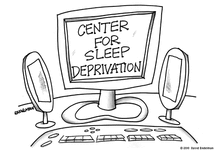|
by Nari Lee '17 In the midst of finals, we are all  Your computer is basically the center for sleep deprivation. [image via] Your computer is basically the center for sleep deprivation. [image via] Charles Czeisler of Harvard Med’s Division of Sleep Medicine warns that our usage of electric lights at night is disrupting our natural sleep patterns and contributing to higher risks of serious health problems. The artificial light coming from above that cubicle in the Sci Li or from your laptop in front is actually as good as or even better than the caffeine you may have had this morning when it comes to keeping you awake. [1] In addition to letting you see the world around you, your eyes send other visual signals to your brain, one of which is “photic resetting of the circadian clock.” [1] As a result, artificial light hitting your retina at a time when your body should naturally be asleep inhibits sleep-promoting neurons and in fact activates neurons that make your more awake. Artificial light further sets off your sleep cycle by suppressing the release of melatonin, a hormone that signals to your body when it’s sleepy time. The widespread use of artificial light in America has contributed to what the CDC calls a “public-health epidemic” of insufficient sleep, and this has tremendous impacts on our health. [2] Sleep deficiency has been linked to motor vehicle crashes, medical errors, and other occupational errors as well as several documented instances of students sleeping through exams. It is also linked to higher risks of chronic diseases like diabetes or cancer.
References:
0 Comments
Leave a Reply. |

